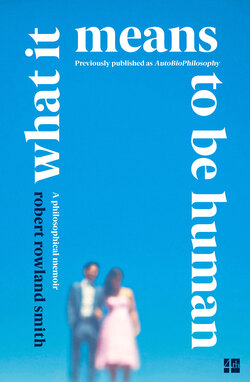Читать книгу What it Means to be Human - Robert Rowland Smith - Страница 8
1 Blood and Water
ОглавлениеMy formula for greatness in a human being is ‘amor fati’: that one wants nothing to be different, not forward, not backward, not in all eternity. Not merely bear what is necessary, still less conceal it … but love it.
Friedrich Nietzsche
At the brow of a hill in Norwood, south London, stands an imposing red-brick building. It is called The British Home and Hospital for Incurables. The word ‘incurable’ sounds strikingly Victorian, and indeed it was during Victoria’s reign, in 1894, that the building was officially opened. Just as striking is the word’s directness. Incurable. The people who come here aren’t going to get better, it says. We might mock the Victorians for their stiff upper lips and prudery, but in their choice of this word, they showed a frankness that we would balk at today.
Among the seventy-odd residents of this Victorian terminus is my father, Colin Rowland Smith. His particular incurability is multiple sclerosis. It is his story that will provide the framework for this first chapter.
The reasons for choosing my father are threefold. First, he represents the origin, along with my mother, of my own life. He is therefore the starting point of my story, which unfolds in the chapters ahead.
The second reason is that, by bringing a real person into the picture, we can gain some initial purchase on what a human being might actually be. For a human being is always a particular human being, not some vague notion of a human being. I often think of an article by the British novelist Zadie Smith, reflecting on the process of writing. She talks about how you always start out with the ambition of penning the perfect book. From the moment you write the first word, however, it becomes this book and no other.
Behind the idea lies, I suppose, a simple logic. That first word limits the range of options for the second word, the second for the third, and so on, until you have a paragraph which determines the next paragraph which determines the next, until you have a chapter. Then each chapter conditions the chapter after it, until the whole thing is done. A book has to follow an internal sequence to reveal its own identity. By definition, this identity will differ from the identity of other books, and so become unique.
As the book, so the human being. None of us has an ideal, perfect or general self. We have the self that we have, with its irreducible specificity, its one-of-a-kind combination of history, biology and character. What’s more, our choices narrow as we grow older, making us even less likely to deviate from who we are. The golden thread that leads from the beginning to the end of our lives only becomes finer along the way. So that is why in this chapter I’m looking at a human being in all his book-like individuality.
The third and most important reason for choosing my father is that his story gives us a first answer to the question that will serve as a prompt to all the chapters ahead. The question is: ‘What does it mean to be a human being?’ Each chapter will offer a different response. In the case of my father, that response goes something like this: ‘Being human means dealing with our fate.’
My father’s fate was a heavy one. It wasn’t just the MS with which he had to contend. Yet how he contended is what matters. It matters for us all. Whether our fate is lucky or unlucky, we are dealt a hand. We might be born into poverty or affluence, good or bad health, peace or war – but the playing of that hand is up to us. And so it is that tension between being determined by our circumstances and determining ourselves which is an essential part of being human.
